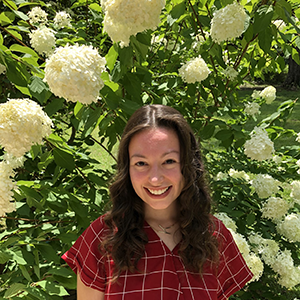 Hometown: Northport, AL
Hometown: Northport, AL
Degree Earned: BA in Foreign Languages and Literature and International Studies; MA in German Studies is pending.
What does service mean to you?
Service is lifting up those around you, working to create a more fair and equitable world, and collaborating with others to better understand and tackle societal and/or global issues. It is pivotal for the fostering of education and institutional relationships. The more time I spend in academia, the more I learn how service in my field can look, and what role I would like to serve in this capacity.
Service can take many different forms. For example, during my year studying at the University of Hamburg, Germany, I came into contact with students in the process of writing their Master of Sciences Theses. As they had to complete their theses in English, their second language, they asked if I might be able to assist in the revision process. This was a valuable experience which also aided in preparing me to read a colleague’s Applied Linguistics Master Thesis this past summer. Peer editing is something that everyone in academia can benefit from, and for me, I am glad that I was able to pay this forward.
I am currently carrying out a Fulbright grant at the Berufsbildende Schulen Cuxhaven (BBS), a vocational school in Germany; part of my involvement in the school is service time spent tutoring and teaching German and English. An unusual aspect of what I am doing in my position as language assistant, aside from my regular duties, which include working one-on-one or in small groups with some of the learners coming from diverse refugee backgrounds teaching beginning and intermediate German as a foreign language, is that I have been given the opportunity to work as the main instructor in some of the classes that I support. It has been especially humbling at this point in time to welcome the newly enrolled Ukrainian students coming to our German as a foreign language classroom. As a passionate language educator, I believe that language acquisition, especially in this context of learning the language of a new home country, allows for an individual to claim their autonomy and provides a greater opportunity for the individual’s freedom of choice when it comes to topics of daily life such as career track options. Moreover, I had the privilege of being invited to research and present a topic for three different English classrooms of my Fulbright school as part of the annual “Europe Days,” programming that reinforces inclusion within society. I chose and prepared the topic “Systematic Racial Inequality” and led a student-centered discussion around the theme. I was honored that the three teachers asked me to return to their classrooms after this event. Furthermore, through my present facilitation of communication, cooperation, and collaboration among current Fulbright grantees and past Fulbright recipients, I aim to foster a group culture with a common goal: to bolster the transatlantic tie and intercultural bridge between students, researchers, and global citizens. My hope is that any service I have performed has benefitted colleagues at UA and even abroad, perhaps.